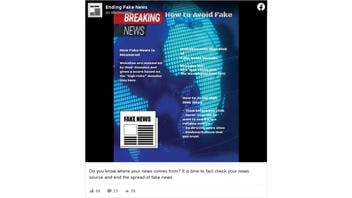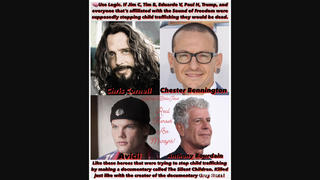
Do the websites of Newsday, the Washington Post and the New York Times have the highest "fake news risk"? No, that's quite misleading: the claim was made in an image put out by a Facebook page that appears to be a student project about fake news but it misrepresents the study on which it is probably based. The three sites it mentions are at high risk of being imitated by people creating fake news according to the study, but that does not mean readers are at a high risk of reading fake news on the Newsday, Washington Post and New York Times sites.
The image with the claims appeared in a Facebook post (archived here) published by a Facebook page named "Ending Fake News" on December 9, 2020. The text in the image read:
How Fake News is Measured
Websites are measured by their domains and given a score based on the "high risk" domains they have.
Websites with high risk of Fake News Include:
Newsday (52)
New York Times (49)
The Washington Post (20)
How to Avoid High Risk Sites
- Think before you click
- Hover over the domain to see if it is a reliable source
- Go directly news sites (sic)
- Bookmark those that you trust
This is what the post looked like on Facebook at the time of writing:
(Source: Facebook screenshot taken on Sun Dec 13 20:26:03 2020 UTC)
The Facebook page "Ending Fake News" describes itself in the sidebar as:
This is a student-run page as a part of a WSU Comstrat 381 course.
It contains various links and images that seem related to a course about fake news. One of the links goes to a Forbes article from 2019 (archived here) describing a press release (archived here) about study by the company behind Domaintools, a service offering researchers information about domain names on the internet.
The study looked at which domain names from major media organizations were most at risk of being imitated by malicious parties that registered near-identical domain names, some probably hoping to get some free website traffic from visitors that made a typo, others maybe looking to imitate the original website to spread false information (like for example this Demi Lovato death hoax Lead Stories wrote about several years ago that was run on a site named nytiwes.com, similar but not quite the same as nytimes.com).
Does that mean the original sites themselves have a "high risk of fake news" like image claims? The study doesn't say anything about that
But since the study names several of the sites mentioned in the image and it also involves a risk score for certain domain names like the image mentions it seems likely the person who created the image got confused about what the study actually said, or maybe just formulated the conclusions in a confusing way. To many people who saw the image, the term "fake news risk" must have seemed to imply that the sites themselves were publishers of disinformation.
That is often how it goes with "fake news": a press release about a limited study gets written up in an article that gets misunderstood by someone who selectively quotes from it and through a game of telephone the message that eventually goes viral bears little relationship to the underlying study. And that is a lesson more people should learn.


















